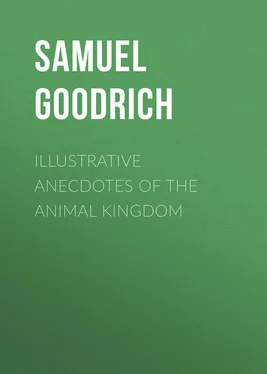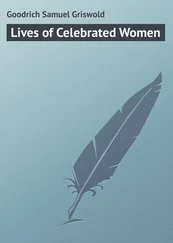Samuel Goodrich - Illustrative Anecdotes of the Animal Kingdom
Здесь есть возможность читать онлайн «Samuel Goodrich - Illustrative Anecdotes of the Animal Kingdom» — ознакомительный отрывок электронной книги совершенно бесплатно, а после прочтения отрывка купить полную версию. В некоторых случаях можно слушать аудио, скачать через торрент в формате fb2 и присутствует краткое содержание. Жанр: Природа и животные, foreign_prose, на английском языке. Описание произведения, (предисловие) а так же отзывы посетителей доступны на портале библиотеки ЛибКат.
- Название:Illustrative Anecdotes of the Animal Kingdom
- Автор:
- Жанр:
- Год:неизвестен
- ISBN:нет данных
- Рейтинг книги:3 / 5. Голосов: 1
-
Избранное:Добавить в избранное
- Отзывы:
-
Ваша оценка:
- 60
- 1
- 2
- 3
- 4
- 5
Illustrative Anecdotes of the Animal Kingdom: краткое содержание, описание и аннотация
Предлагаем к чтению аннотацию, описание, краткое содержание или предисловие (зависит от того, что написал сам автор книги «Illustrative Anecdotes of the Animal Kingdom»). Если вы не нашли необходимую информацию о книге — напишите в комментариях, мы постараемся отыскать её.
Illustrative Anecdotes of the Animal Kingdom — читать онлайн ознакомительный отрывок
Ниже представлен текст книги, разбитый по страницам. Система сохранения места последней прочитанной страницы, позволяет с удобством читать онлайн бесплатно книгу «Illustrative Anecdotes of the Animal Kingdom», без необходимости каждый раз заново искать на чём Вы остановились. Поставьте закладку, и сможете в любой момент перейти на страницу, на которой закончили чтение.
Интервал:
Закладка:
"The pursuit of the bear is a matter of the first importance to some of the Indian tribes, and is never undertaken without much ceremony. A principal warrior gives a general invitation to all the hunters. This is followed by a strict fast of eight days, in which they totally abstain from food, but during which the day is passed in continual song. This is done to invoke the spirits of the woods to direct the hunters to the places where there are abundance of bears. They even cut the flesh in divers parts of their bodies, to render the spirits more propitious. They also address themselves to the manes of the beasts slain in the preceding chases, and implore these to direct them, in their dreams, to an abundance of game. The chief of the hunt now gives a great feast, at which no one dares to appear without first bathing. At this entertainment, contrary to their usual custom, they eat with great moderation. The master of the feast touches nothing, but is employed in relating to the guests ancient tales of feasts in former chases; and fresh invocations to the manes of the deceased bears conclude the whole.
"They then sally forth, equipped as if for war, and painted black. They proceed on their way in a direct line, not allowing rivers, marshes, or any other impediment, to stop their course, and driving before them all the beasts they find. When they arrive at the hunting-ground, they surround as large a space as they can, and then contract their circle, searching, at the same time, every hollow tree, and every place capable of being the retreat of a bear; and they continue the same practice till the chase is expired.
"As soon as a bear is killed, a hunter puts into his mouth a lighted pipe of tobacco, and, blowing into it, fills the throat with the smoke, conjuring the spirit of the animal not to resent what they are about to do to its body, or to render their future chases unsuccessful. As the beast makes no reply, they cut out the string of the tongue, and throw it into the fire. If it crackle and shrivel up, which it is almost sure to do, they accept this as a good omen; if not, they consider that the spirit of the beast is not appeased, and that the chase of the next year will be unfortunate."
When our forefathers first settled in America, bears were common in all parts of the country along the Atlantic. Many adventures with them took place, some of which are recorded in the histories of the times. The following is said to have occurred at a later period: —
Some years since, when the western part of New York was in a state of nature, and wolves and bears were not afraid of being seen, some enterprising pilgrim had erected, and put in operation, a sawmill, on the banks of the Genesee. One day, as he was sitting on the log, eating his bread and cheese, a large, black bear came from the woods towards the mill. The man, leaving his luncheon on the log, made a spring, and seated himself on a beam above; when the bear, mounting the log, sat down with his rump towards the saw, which was in operation, and commenced satisfying his appetite on the man's dinner. After a little while, the saw progressed enough to interfere with the hair on bruin's back, and he hitched along a little, and kept on eating. Again the saw came up, and scratched a little flesh. The bear then whirled about, and, throwing his paws around the saw, held on, till he was mangled through and through, when he rolled off, fell through into the flood, and bled to death.
The Grisly Bear. – This creature, which is peculiar to North America, is, perhaps, the most formidable of the bruin family in magnitude and ferocity. He averages twice the bulk of the black bear, to which, however, he bears some resemblance in his slightly elevated forehead, and narrow, flattened, elongated muzzle. His canine teeth are of great size and power. The feet are enormously large – the breadth of the fore foot exceeding nine inches, and the length of the hind foot, exclusive of the talons, being eleven inches and three quarters, and its breadth seven inches. The talons sometimes measure more than six inches. He is, accordingly, admirably adapted for digging up the ground, but is unable to climb trees, in which latter respect he differs wholly from most other species. The color of his hair varies to almost an indefinite extent, between all the intermediate shades of a light gray and a black brown; the latter tinge, however, being that which predominates. It is always in some degree grizzled, by intermixture of grayish hairs. The hair itself is, in general, longer, finer, and more exuberant, than that of the black bear.
The neighborhood of the Rocky Mountains is one of the principal haunts of this animal. There, amidst wooded plains, and tangled copses of bough and underwood, he reigns as much the monarch as the lion is of the sandy wastes of Africa. Even the bison cannot withstand his attacks. Such is his muscular strength, that he will drag the ponderous carcass of the animal to a convenient spot, where he digs a pit for its reception. The Indians regard him with the utmost terror. His extreme tenacity of life renders him still more dangerous; for he can endure repeated wounds which would be instantaneously mortal to other beasts, and, in that state, can rapidly pursue his enemy; so that the hunter who fails to shoot him through the brain is placed in a most perilous situation.
One evening, the men in the hindmost of one of Lewis and Clark's canoes perceived one of these bears lying in the open ground, about three hundred paces from the river; and six of them, who were all good hunters, went to attack him. Concealing themselves by a small eminence, they were able to approach within forty paces unperceived; four of the hunters now fired, and each lodged a ball in his body, two of which passed directly through the lungs. The bear sprang up, and ran furiously, with open mouth, upon them; two of the hunters, who had reserved their fire, gave him two additional wounds, and one, breaking his shoulder-blade, somewhat retarded his motions. Before they could again load their guns, he came so close on them, that they were obliged to run towards the river, and before they had gained it, the bear had almost overtaken them. Two men jumped into the canoe; the other four separated, and, concealing themselves among the willows, fired as fast as they could load their pieces. Several times the bear was struck, but each shot seemed only to direct his fury towards the hunters; at last he pursued them so closely that they threw aside their guns and pouches, and jumped from a perpendicular bank, twenty feet high, into the river. The bear sprang after them, and was very near the hindmost man, when one of the hunters on the shore shot him through the head, and finally killed him. When they dragged him on shore, they found that eight balls had passed through his body in different directions.
Richardson relates the following story of a grisly bear. A party of voyagers, who had been employed all day in tracking a canoe up the Saskatchewan, had seated themselves, in the twilight, by a fire, and were busy in preparing their supper, when a large grisly bear sprang over their canoe that was behind them, and, seizing one of the party by the shoulder, carried him off. The rest fled in terror, with the exception of a man named Bourasso, who, grasping his gun, followed the bear as it was retreating leisurely with its prey. He called to his unfortunate comrade that he was afraid of hitting him if he fired at the bear; but the latter entreated him to fire immediately, as the animal was squeezing him to death. On this he took a deliberate aim, and discharged his piece into the body of the bear, which instantly dropped its prey to pursue Bourasso. He escaped with difficulty, and the bear retreated to a thicket, where it is supposed to have died. The man who was rescued had his arm fractured, and was otherwise severely bitten by the bear, but finally recovered.
Читать дальшеИнтервал:
Закладка:
Похожие книги на «Illustrative Anecdotes of the Animal Kingdom»
Представляем Вашему вниманию похожие книги на «Illustrative Anecdotes of the Animal Kingdom» списком для выбора. Мы отобрали схожую по названию и смыслу литературу в надежде предоставить читателям больше вариантов отыскать новые, интересные, ещё непрочитанные произведения.
Обсуждение, отзывы о книге «Illustrative Anecdotes of the Animal Kingdom» и просто собственные мнения читателей. Оставьте ваши комментарии, напишите, что Вы думаете о произведении, его смысле или главных героях. Укажите что конкретно понравилось, а что нет, и почему Вы так считаете.












